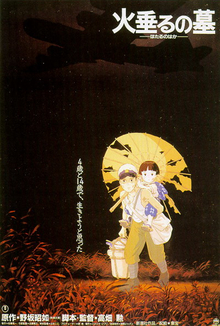I’ve left this, perhaps the most heartbreaking of the Studio Ghibli films, for among the last. I couldn’t help but be partially spoiled in advance as this is so well known but it turned out to be very different from what I expected. For example the famous firebombing scene takes place at the very beginning. It sets the stage for the trials of the brother and sister duo but doesn’t really play a part after that. In fact it seems to me that what causes their deaths isn’t the war at all and I found the situation that the two found themselves in to be implausibly contrived in order to maximize their suffering. Contrary to expectations, I didn’t much care for this film.
The opening shot of Seita’s corpse curled up on the floor of a train station telegraphs in advance that both siblings end up dead. He and his younger sister Setsuko live in Kobe with their mother while their father serves as an officer aboard an Imperial Japanese Navy warship. The two children are separated from their mother when the city is bombed and their entire neighborhood go up in flames. The next day, Seita learns that their mother has been badly burned and subsequently passes away without regaining consciousness. He conceals the death from his sister and they move into the house of a distant aunt. As food rations shrink and Keita has no work apart from taking care of Setsuko, the aunt increasingly resent their presence. Eventually he decides to move out to live by themselves in a small and abandoned bomb shelter, catching fireflies to use as lighting and scrounging for food wherever he can. While they seem happy and carefree at first, Setsuko gets sick due to malnutrition and Seita has to resort to stealing food to survive.
This is indeed a heartbreaking film and it’s tough not to tear up at the plight of the siblings. Yet it is also obvious how hard director and writer Isao Takahata twisted the narrative to make it so. At every turn, Seita is frustrated in his attempts to seek help from adults. It’s not just his aunt and her family. The farmer he goes to has no food to spare and hauls him to the police for theft. The police decides not to punish Seita any further but offers no other help. The doctor who sees Setsuko coldly diagnoses her ailment as malnutrition and has nothing else to say. This widespread indifference to the tragedy of two orphans who have no one looking out for them would make more sense if everyone else were as badly off but this doesn’t seem to be the case. While times are tough for everyone and food supplies are limited, society as whole still functions and the government still operates. The film makes a point to show that rich families are still doing well and other ordinary children are certainly not starving. Somehow Seita and Setsuko have fallen through the cracks of society and their troubles are invisible. To me, this feels very similar to the scenario of Nobody Knows. Takahata isn’t blaming the Americans who bombed them, or even the war. He’s blaming Japanese society for their coldness and allowing two children to starve within their midst. I’m surprised that this didn’t provoke a massive reaction from the Japanese when it was released!
I don’t like it partly because it’s such a forced and contrived dilemma and partly because in my opinion Seita shares so much of the blame on his own shoulders. Sure, he’s only a kid himself and doesn’t know any better, but so many of his decisions are just asinine. He is too proud to apologize and ask for help from his relatives even when it’s a matter of life and death. He apparently tries to stretch out his mother’s bank savings when they don’t even have enough to eat. His aunt asks why he doesn’t need to school or have a job and his answers don’t make sense at all. Even if his old school burned down, he should be assigned to a new one or to a work unit of some kind. The reason I can think of why he would keep refusing, even to volunteer for the neighborhood fire brigade, might be because he doesn’t want to be separated from Setsuko for any reason whatsoever. His love and dedication towards his sister might be commendable but he is going about it in the wrong way! I note that Takahata himself remarked that the film is really about people whose lives are isolated from the rest of society. This means that the cave the siblings find themselves in doesn’t represent some sort of idyllic retreat but exile from society.
In terms of art and production values, it’s generally on par with the rest of Studio Ghibli’s works but of course it’s much more sombre in tone. As my wife notes, there are no cute animals or spirits in this one and even the fireflies die as the title indicates. I contend that it suffers from mixed messaging on the supposed heroism of the brother and it wants to drive the audience to tears in a way that feels unearned as their situation is too contrived. I’m left sorely disappointed as this does not at all matching its glowing reputation.
